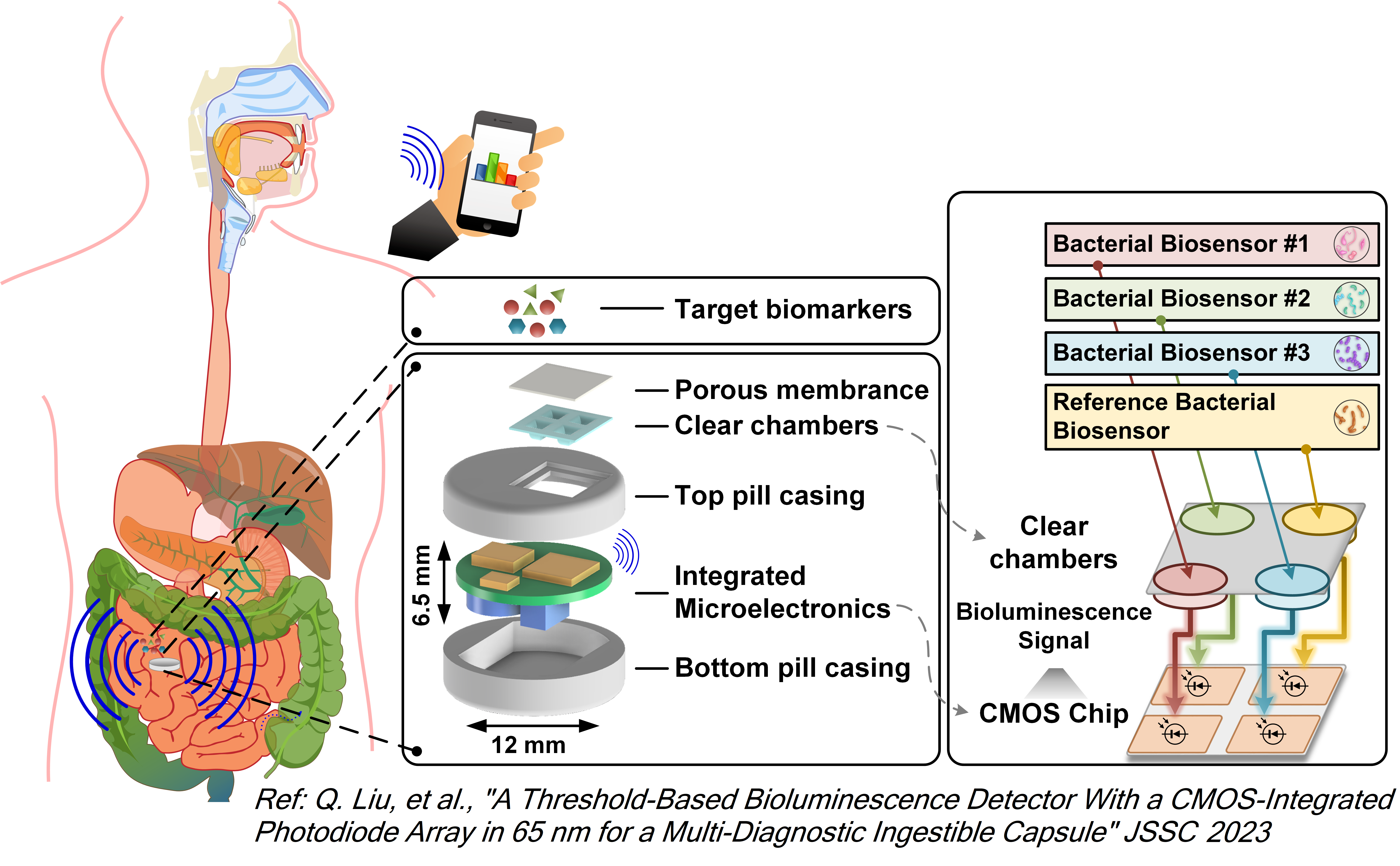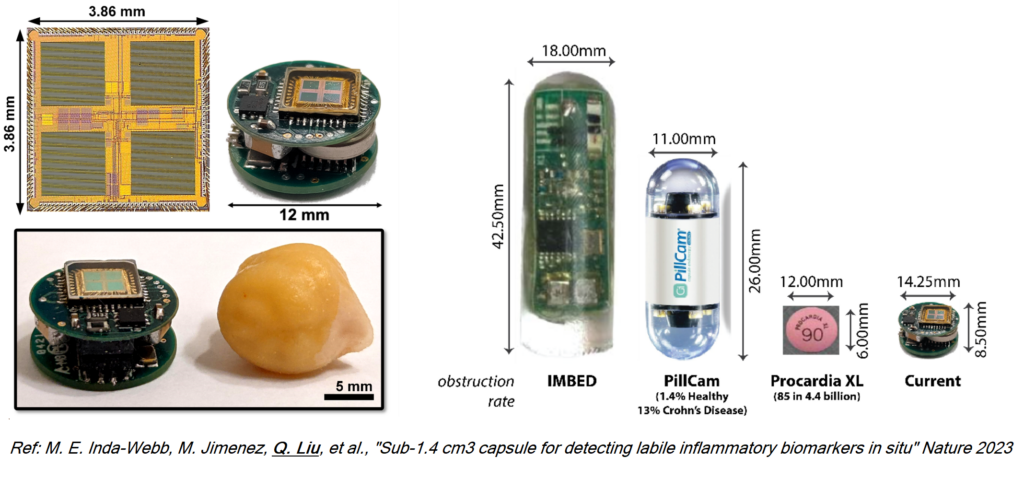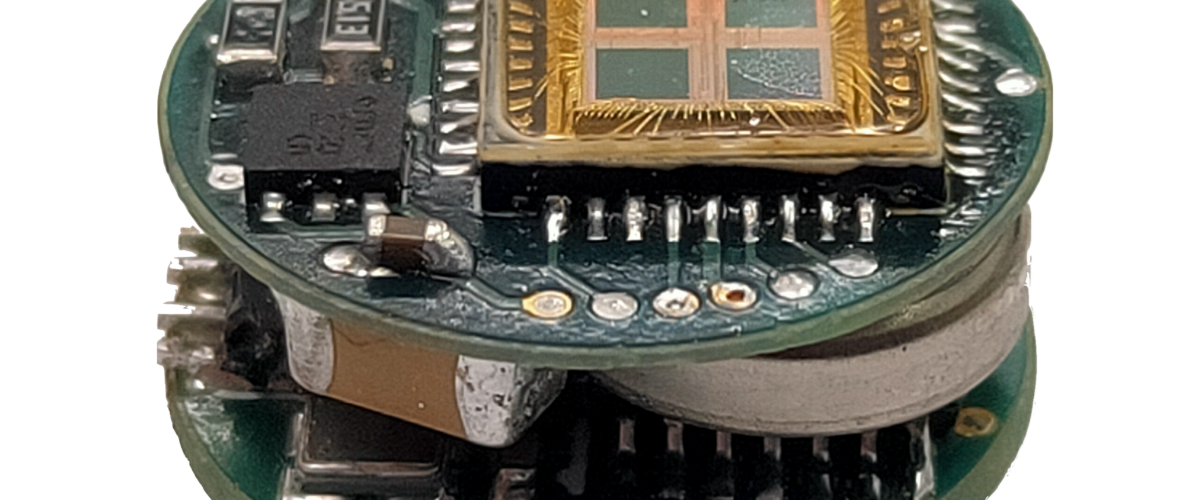Overview
At the core of our scientific methodology lies the strategic integration of living sensors—specifically, genetically engineered biological systems—with secure, custom-designed integrated circuits. This innovative fusion defines the emerging field of cyber-secure biological systems (CSBS). By capitalizing on biology to sense biology, we unlock the inherent advantages of natural sensors, including resilience in harsh environments, heightened sensitivity, and exceptional specificity. This distinctive synergy not only harnesses the robust attributes of biology but also seamlessly incorporates the reliability and communication infrastructure of electronics. The result is an unparalleled solution that addresses critical societal challenges in healthcare and environmental monitoring, paving the way for transformative advancements at the intersection of synthetic biology and semiconductor technologies.
Ingestible Bioelectronic Capsules for Gastrointestinal Diseases:

Collaborators:
Dr. Maria Eugenia Inda – MIT BE, Dr. Miguel Jimenez – MIT MechE, Prof. Giovanni Traverso – MIT MechE, Prof. Timothy Lu – MIT BE, Dr. Phillip Nadeau – Analog Devices, Prof. David Starobinski – BU ECE (Wireless Security)
Funding: The Helmsley Charitable Trust, Catalyst Foundation, CISE Seed/ENG Dean Catalyst Award (Wireless Security)
Team: Qijun Liu (Lead Integrated Circuit Designer), Timur Zirtiloglu, Arslan Riaz, Alperen Yasar (Wireless Security)
Approximately one in five individuals experience gastrointestinal (GI) disorders at different points in their lives. Monitoring these inflammatory processes in real-time poses a significant challenge due to the inaccessible and difficult-to-sample chemical environment of the GI tract. Compounding this issue is the short-lived nature of key mediators, such as nitric oxide, involved in inflammatory diseases. Profiling these labile biomolecules, crucial for disease mediation and response to medication, is essential for advancing our capabilities in diagnosing, monitoring, treating, and preventing GI disorders.

In response to the pressing medical need to predict and prevent inflammatory bowel disease, we have recently developed an ingestible multi-diagnostic bioelectronic capsule. This innovative capsule, showcased in Nature 2023 and JSSC 2023, addresses the real-time detection of critical labile disease biomarkers in the GI tract. Our low-power ingestible capsule, compact at 1.35 cm³, is designed for safe human ingestion and GI transit, surpassing the commercial state-of-the-art (2.13 cm³) in size. Successful testing in pigs demonstrates the feasibility of creating a human-scale diagnostic device capable of detecting transient mediators of GI inflammatory diseases. Additionally, our research delves into assessing the security vulnerabilities of resource-constrained wireless ingestible capsules for diagnostic and therapeutic purposes, as detailed in BioCAS 2022. Recognizing the constraints on energy, computation, and size, we are actively developing low-power countermeasures in the physical layer to enhance security.
Our cost-effective, miniaturized device promises to revolutionize monitoring by enabling more frequent and remote assessments, even from the comfort of a patient’s home—an especially advantageous feature for the elderly. These non-invasive sensors, safer than current treatments, offer an affordable point-of-care alternative to endoscopy. This technology will significantly impact future ingestible diagnostic and therapeutic-delivery hybrid bioelectronic systems, providing relief to potentially millions of patients suffering from intestinal diseases.
Publications:
Demos:
- IEEE ISSCC 2021 SRP [Poster and Demo]
Hybrid Microfluidic-Bioelectronic Systems:

Collaborators:
Prof. Douglas Densmore – BU ECE / BME, Prof. Wilson Wong – BU BME, Prof. Ahmad Khalil – BU BME
Funding: NSF SemiSynBio-II, Catalyst Foundation
Project-Specific / Collaborator Websites: SemiSynBio, CIDAR Lab: Cyber-Secure Biological Systems
Team: Qijun Liu (Lead Integrated Circuit Designer), Alperen Yasar, Dilara Caygara, Diana Arguijo (Douglas Densmore’s Ph.D. student), Jingyao Chen (Wilson Wong’s Ph.D. student), Ezira Yimer Wolle (Ahmad Khalil’s Ph.D. student), Colin Kunze (Ahmad Khalil’s Ph.D. student), Dr. David McIntrye (Ph.D. alumni of Douglas Densmore’s group)
In the pursuit of efficiently testing and optimizing biosensor performance for real-world applications, traditional experimental procedures can be daunting due to their labor-intensive nature. This complexity becomes particularly pronounced when attempting to screen large biosensor libraries, encompassing millions of combinations, across a multitude of environmental and chemical variables. Our approach involves co-designing a modular droplet microfluidic device, seamlessly integrated with embedded CMOS electronic sensors. This cutting-edge innovation revolutionizes the testing process, enabling rapid screening of the biological design space in diverse environments. The result is an elevated biosensor performance, finely tuned to specific application conditions such as wastewater monitoring, thereby ensuring optimal sensitivity, specificity, and durability.
Publications:
Demos:
- IEEE ISSCC 2023 SRP [Best Poster and Demo Award]
